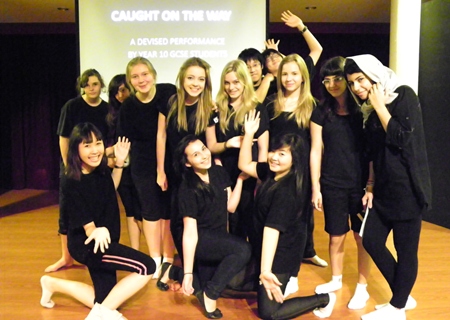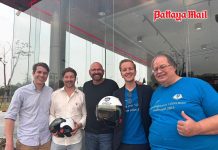Last week the Year 10 Drama Group performed a 20-minute piece of devised theatre called Caught on the Way. It is likely that most of the audience watching this compelling and tightly focused performance would probably have been unaware of the tragedy that unfolded in Argentina in the 1970’s and early 1980’s in what became to be known as The Dirty War. (Spanish: Guerra Sucia)
The Dirty War was a period of state-sponsored violence: as well as guerilla fighters, victims of the violence included several thousand left-wing activists and militants, including trade unionists, students, journalists and sympathizers. Estimates for the number of people who were killed or ‘disappeared’ range from 9,000 to 30,000. Victims of the violence were often snatched from their homes or arrested ‘on the way’. Without legal representation or their families’ knowledge, thousands were simply never heard of again. Many of the victims were thrown bound and blindfolded from helicopters in the south Atlantic so no earthly trace of their existence would ever be detected. Furthermore, hundreds of babies were taken from imprisoned mothers and adopted whilst the real mothers were killed.
 “Caught on the Way” cast.
“Caught on the Way” cast.
Since the Dirty War took place Argentina has experienced a cycle of economic downturn and more recent prosperity. It is in this context of a nation reflecting on its past that provided the starting point for this particularly powerful drama that must necessarily have afflicted and continues to haunt countless families across the nation. It is the city of Buenos Aires in the early 1990’s. A young university student, Maria Gonzales begins to ask questions about her identity. Her search leads her to a hospital where she uncovers facts that are at one disturbing and life-changing. As well as focusing on issues of personal identity and how much we know of ourselves and what lies behind the seeming reality if inter-personal relationships, the drama highlighted a cogent question as to exactly how a nation deals with its past – whether it be Germany, Russia, Czechoslovakia or Argentina. (Exactly the same questions were asked in the 2009 Argentine Oscar winning film The Secret in their Eyes (Spanish: El Secreto de Sus Ojos).
The drama was prefaced by an informative power-point which cogently provided the necessary facts and images whilst at the same time deftly leading the audience into the beating heart of the play.
This intensely human drama was made completely believable by the performances, particularly those of Anastasia and Juste who played the respective roles of the adopted daughter Maria and Adriana Gonzalez, the foster mother. Their characterizations combined combative strength with a quality of stillness, dignity and control which added to the verisimilitude of their scenes and the helplessness of these individuals enmeshed in a hideous human dilemma.
The plot seamlessly alternated between past and present which gave the actors opportunity to demonstrate their movement skills and understanding of non-naturalistic theatre. Brutal violence was paradoxically depicted through gracefully stylized movement and the poignant plight of the Mothers of the Playa de Mayo was realized using choral speaking and samples of actual photographs of some of the victims of the Dirty War. The haunting music and dim lighting somehow suggested ghosts of the past intermingling uncomfortably with the consciences of the present day citizens of Argentina: it is a fact that many of the perpetrators of the violence have yet to be brought to justice.
This was a powerful telling of a story that needs to be more widely known. The performance by this accomplished group of Year 10 GCSE Drama students will surely resonate in the memory.




